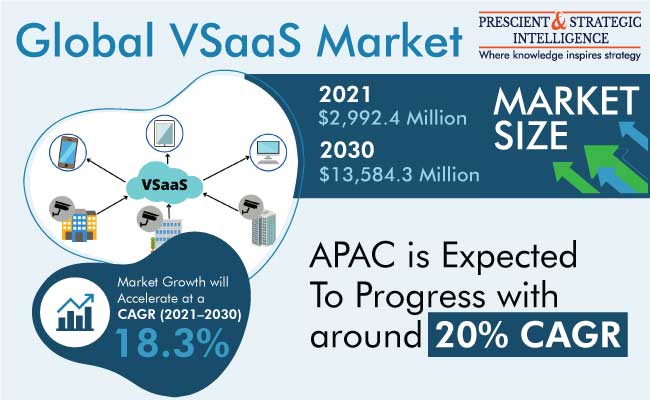Why North America Rules Video Surveillance as a Service (VSaaS) Market?
By 2030, the global video surveillance as a service market is predicted to touch $13,584.3 million, since being valued at $2,992.4 million in 2021. The market will grow at an 18.3% CAGR from 2021 to 2030 owing to the rising number of smart cameras and several accompanying sensors, which has resulted in an inclination toward in-band analytics. This combination of variables will augment growth in the market. For instance, there is extensive use of in-band analytics, smart cameras, and other techniques to facilitate operations.
The enormous adoption of cloud-based services is creating lucrative opportunities for the video surveillance as a service market. The swift adoption of technology will help the market players to adapt to the shifts in the tastes and preferences of the consumers and the existing market dynamics. Thus, the rising availability of higher frequency bandwidths and various innovations made in cloud computing technology will drive the global market. Users in the surveillance industry are robustly using cloud-based services to cater to their requirements. There is an inherent benefit of swifter response, evidence tampering prevention, and enhanced reach.
The surging internet penetration will spur the video surveillance as a service market growth. A market share of at least 35% is held by the hosted category, based on type. This can be ascribed to the extensive utilization of hosted video surveillance as a service in the development of smart cities, and the retail and residential sectors. Moreover, swift-paced internet connectivity, profit-orientation of 5G services, and the surging mobile phone penetration will propel growth in this industry. The lower subscription fees will account for higher sales.
Within the vertical segment, the BFSI sector will generate high revenue in the video surveillance as a service market on account of the rising disposable income of the people. The VSaaS provides several benefits including surveillance data access, adding devices flexibility, and lower initial costs. Because of this, these devices are being highly integrated into financial institutions to keep an eye on staff and customers. Furthermore, it also reduces the threats of robberies and kidnapping, enabling the detection of frauds at cash centers to deploy security within banking processes.
North America rules the video surveillance as a service market, accounting for approximately 40% of the total revenue. This can be credited to extensive government support, rising threats of terrorism, and surging crime rates in the region. The most usual users of VSaaS are office spaces, restaurants, and hotels. There is an increasing installation of modern surveillance systems by the government in public spaces. In addition, it is also working to expand the usage of these services in the infrastructure and defense industries.
Moreover, there is a consistent growth in the European industry because of extensive government support, greater deployment of technologically advanced devices in numerous sectors, coupled with a rising integration of cloud-enabled VSaaS. In addition, APAC will also not lag due to the rising preference for the smart city concept and greater concerns about safety among the citizens in the digitalized era. Thus, the market will boom in the coming years globally.
Hence, extensive government support and rising internet penetration will drive the market.
Read More: https://www.psmarketresearch.com/market-analysis/video-surveillance-as-a-service-market
By 2030, the global video surveillance as a service market is predicted to touch $13,584.3 million, since being valued at $2,992.4 million in 2021. The market will grow at an 18.3% CAGR from 2021 to 2030 owing to the rising number of smart cameras and several accompanying sensors, which has resulted in an inclination toward in-band analytics. This combination of variables will augment growth in the market. For instance, there is extensive use of in-band analytics, smart cameras, and other techniques to facilitate operations.
The enormous adoption of cloud-based services is creating lucrative opportunities for the video surveillance as a service market. The swift adoption of technology will help the market players to adapt to the shifts in the tastes and preferences of the consumers and the existing market dynamics. Thus, the rising availability of higher frequency bandwidths and various innovations made in cloud computing technology will drive the global market. Users in the surveillance industry are robustly using cloud-based services to cater to their requirements. There is an inherent benefit of swifter response, evidence tampering prevention, and enhanced reach.
The surging internet penetration will spur the video surveillance as a service market growth. A market share of at least 35% is held by the hosted category, based on type. This can be ascribed to the extensive utilization of hosted video surveillance as a service in the development of smart cities, and the retail and residential sectors. Moreover, swift-paced internet connectivity, profit-orientation of 5G services, and the surging mobile phone penetration will propel growth in this industry. The lower subscription fees will account for higher sales.
Within the vertical segment, the BFSI sector will generate high revenue in the video surveillance as a service market on account of the rising disposable income of the people. The VSaaS provides several benefits including surveillance data access, adding devices flexibility, and lower initial costs. Because of this, these devices are being highly integrated into financial institutions to keep an eye on staff and customers. Furthermore, it also reduces the threats of robberies and kidnapping, enabling the detection of frauds at cash centers to deploy security within banking processes.
North America rules the video surveillance as a service market, accounting for approximately 40% of the total revenue. This can be credited to extensive government support, rising threats of terrorism, and surging crime rates in the region. The most usual users of VSaaS are office spaces, restaurants, and hotels. There is an increasing installation of modern surveillance systems by the government in public spaces. In addition, it is also working to expand the usage of these services in the infrastructure and defense industries.
Moreover, there is a consistent growth in the European industry because of extensive government support, greater deployment of technologically advanced devices in numerous sectors, coupled with a rising integration of cloud-enabled VSaaS. In addition, APAC will also not lag due to the rising preference for the smart city concept and greater concerns about safety among the citizens in the digitalized era. Thus, the market will boom in the coming years globally.
Hence, extensive government support and rising internet penetration will drive the market.
Read More: https://www.psmarketresearch.com/market-analysis/video-surveillance-as-a-service-market
Why North America Rules Video Surveillance as a Service (VSaaS) Market?
By 2030, the global video surveillance as a service market is predicted to touch $13,584.3 million, since being valued at $2,992.4 million in 2021. The market will grow at an 18.3% CAGR from 2021 to 2030 owing to the rising number of smart cameras and several accompanying sensors, which has resulted in an inclination toward in-band analytics. This combination of variables will augment growth in the market. For instance, there is extensive use of in-band analytics, smart cameras, and other techniques to facilitate operations.
The enormous adoption of cloud-based services is creating lucrative opportunities for the video surveillance as a service market. The swift adoption of technology will help the market players to adapt to the shifts in the tastes and preferences of the consumers and the existing market dynamics. Thus, the rising availability of higher frequency bandwidths and various innovations made in cloud computing technology will drive the global market. Users in the surveillance industry are robustly using cloud-based services to cater to their requirements. There is an inherent benefit of swifter response, evidence tampering prevention, and enhanced reach.
The surging internet penetration will spur the video surveillance as a service market growth. A market share of at least 35% is held by the hosted category, based on type. This can be ascribed to the extensive utilization of hosted video surveillance as a service in the development of smart cities, and the retail and residential sectors. Moreover, swift-paced internet connectivity, profit-orientation of 5G services, and the surging mobile phone penetration will propel growth in this industry. The lower subscription fees will account for higher sales.
Within the vertical segment, the BFSI sector will generate high revenue in the video surveillance as a service market on account of the rising disposable income of the people. The VSaaS provides several benefits including surveillance data access, adding devices flexibility, and lower initial costs. Because of this, these devices are being highly integrated into financial institutions to keep an eye on staff and customers. Furthermore, it also reduces the threats of robberies and kidnapping, enabling the detection of frauds at cash centers to deploy security within banking processes.
North America rules the video surveillance as a service market, accounting for approximately 40% of the total revenue. This can be credited to extensive government support, rising threats of terrorism, and surging crime rates in the region. The most usual users of VSaaS are office spaces, restaurants, and hotels. There is an increasing installation of modern surveillance systems by the government in public spaces. In addition, it is also working to expand the usage of these services in the infrastructure and defense industries.
Moreover, there is a consistent growth in the European industry because of extensive government support, greater deployment of technologically advanced devices in numerous sectors, coupled with a rising integration of cloud-enabled VSaaS. In addition, APAC will also not lag due to the rising preference for the smart city concept and greater concerns about safety among the citizens in the digitalized era. Thus, the market will boom in the coming years globally.
Hence, extensive government support and rising internet penetration will drive the market.
Read More: https://www.psmarketresearch.com/market-analysis/video-surveillance-as-a-service-market

·8K Views
·0 Reviews

